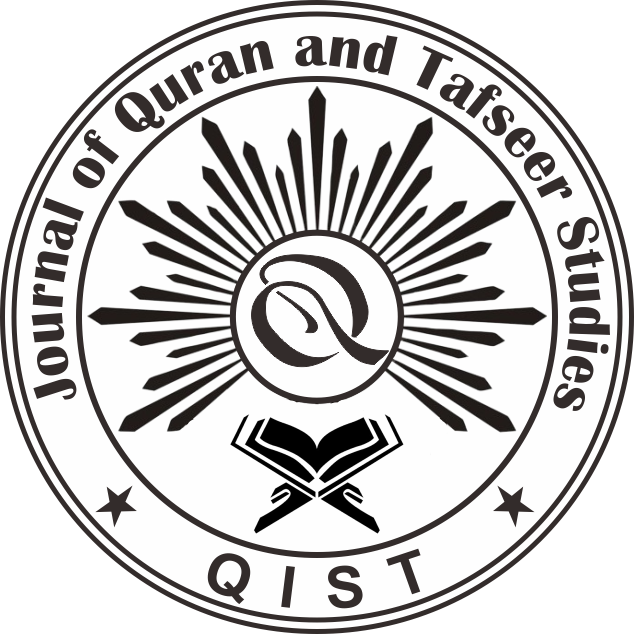Quranic Foundations of Maqasid Shariah in the Design of Islamic-Compliant Hotel Services in Malaysia
DOI:
https://doi.org/10.23917/qist.v4i2.11010Keywords:
Quranic values, Maqasid Shariah, Shariah-compliant hospitality, Islamic hotel services, MalaysiaAbstract
This article examines the Quranic foundations of Maqasid Shariah and their relevance to the design of Islamic-compliant hotel services in Malaysia. In response to the growing demand for Shariah-compliant hospitality among Muslim travelers, there is an urgent need for service models that integrate religious principles with customer expectations. The study employs a qualitative thematic analysis of selected Quranic verses that represent the five essential objectives of Maqasid Shariah: the preservation of religion, life, intellect, lineage, and property. These objectives are explored in relation to their operational implications within hotel services such as cleanliness, privacy, ethical marketing, worship facilities, and food preparation. The findings demonstrate that Quranic guidance provides a holistic ethical framework capable of shaping spiritually meaningful and sustainable hotel management models. This study offers valuable insights for policymakers, hoteliers, and Shariah scholars seeking to harmonize spiritual authenticity with contemporary hospitality practices in Malaysia.
References
[1] Abd Rahman, S. N. H., Azli, R. M., Zhaffar, N. M., Ulirrahmi, F., Babge, S. N., & Mahadi, M. H. (2024). Transformation of the Halal Hotel Industry: Perspectives from Malaysia and Indonesia. Journal of Halal Science and Technology, 3(2), 9-17. https://doi.org/10.59202/jhst.v3i2.950
[2] Abd Rahman, S. N. H. (2025). Masa Depan Industri Hotel Halal di Malaysia dan ... ["Masa Depan Industri Hotel Halal di Malaysia dan ..."]. Jurnal Islam dan ... (OJIMF)
[3] Abd Rahman, S. N. H., Rafidah Mohd Azli, Nursafra Mohd Zhaffar, & Siti Nadiah Babge (2025). Important References for Shariah-Compliant Hotels: Global and Local Perspectives. Jurnal Islam dan Masyarakat Kontemporari, 26(1)
[4] Alauddin, M., Hasan, R., & Ismail, M. N. (2023). The integration of Maqasid al-Shariah into Islamic business ethics: Implications for service innovation. Journal of Islamic Marketing, 14(2), 345-361. https://doi.org/10.1108/JIMA-08-2022-0221
[5] Auda, J. (2008). Maqasid al-Shariah as philosophy of Islamic law: A systems approach. International Institute of Islamic Thought.
[6] Battour, M., & Ismail, M. N. (2016). Halal tourism: Concepts, practises, challenges and future. Tourism Management Perspectives, 19, 150-154. https://doi.org/10.1016/j.tmp.2015.12.008
[7] Braun, V., & Clarke, V. (2006). Using thematic analysis in psychology. Qualitative Research in Psychology, 3(2), 77-101. https://doi.org/10.1191/1478088706qp063oa
[8] Crescentrating. (2024). Global Muslim Travel Index (GMTI) 2024. https://www.crescentrating.com/reports/gmti.html
[9] Halal Development Corporation. (2023). Halal industry performance report 2023: Malaysia halal economy outlook. Kuala Lumpur: HDC Publications.
[10] Henderson, J. C. (2021). Islamic tourism and hospitality: Concepts and issues. Tourism Recreation Research, 46(2), 143-152. https://doi.org/10.1080/02508281.2020.1797490
[11] Kamali, M. H. (2021). Maqasid al-Shariah: Made simple (2nd ed.). International Institute of Advanced Islamic Studies (IAIS) Malaysia.
[12] Kamarzaman, M. H., Abd Rahman, S. N. H., Kamaruzaman, M. A. S., Azli, R. M., & Zhaffar, N. M. (2025). Application of Maqasid Shariah in Islamic Hotel Industry in Malaysia: An Overview. International Journal of Research and Innovation in Social Science (IJRISS), 9(4), 617-622.
[13] Malaysian Association of Hotels. (2024). Annual industry report 2024: Guest perceptions and service performance. Kuala Lumpur: MAH Research Unit.
[14] Md Hashim, N. H., Musa, G., & Mohd Yusof, R. N. R. (2022). Conceptualizing halal hotel attributes based on Maqasid Shariah. Journal of Islamic Marketing, 13(8), 1815-1833. https://doi.org/10.1108/JIMA-01-2021-0034
[15] Mohd Yusof, R. N. R., & Shaharuddin, N. (2020). Customer expectations and perceptions toward Islamic hotel services in Malaysia. Journal of Hospitality and Tourism Management, 44, 200-210. https://doi.org/10.1016/j.jhtm.2020.05.004
[16] Nasrullah, M., & Nuruddin, A. (2023). Thematic study of the Quran based on Maqasid Shariah: A new approach to understanding Islamic values. Quranic Studies International, 9(2), 55-72.
[17] Oktadiana, H., Pearce, P. L., & Chon, K. (2022). Muslim travelers' needs: A critical review and future research agenda. Tourism Management Perspectives, 42, 100946. https://doi.org/10.1016/j.tmp.2022.100946
[18] Razalli, M. R., Yusoff, M. Y. Z., & Mustapha, M. Z. (2021). Developing Shariah-compliant hotel practices: A case study in Malaysia. International Journal of Contemporary Hospitality Management, 33(4), 1365-1384. https://doi.org/10.1108/IJCHM-05-2020-0466
[19] Shafaei, F., Gholipour, H. F., & Mohamed, B. (2023). Toward an Islamic service framework: Exploring Maqasid al-Shariah in the hospitality context. International Journal of Islamic and Middle Eastern Finance and Management, 16(1), 113-132. https://doi.org/10.1108/IMEFM-07-2022-0307
[20] Tourism Malaysia. (2024). Malaysia tourism performance report 2024: Islamic and halal tourism insights. Putrajaya: Ministry of Tourism, Arts and Culture.
[21] Abdullah, M., Gokaru, S. U., Mohd Nor, M. R., Amir, S. B., & Norasid, M. A. B. (2024). The Glorious Quran and Distortion in Its Interpretation in Malaysia: A Solution in the Views of Muslim Exegetes. AlBayan, 22(3), 383-405. https://doi.org/10.1163/22321969-20240157
[22] Aliti, R. (2021). Application of Design Thinking for Quranic Exegesis. International Journal of Islamic Thought, 20, 120-125. https://doi.org/10.24035/ijit.20.2021.216
[23] Elaziz, M. F., & Kurt, A. (2017). Religiosity, consumerism and halal tourism: A study of seaside tourism organizations in Turkey. Tourism, 65(1), 115-128. https://www.scopus.com/inward/record.uri?eid=2-s2.0-85019490490&partnerID=40&md5=a11d723fec85ac51faa026d6a35daca6
[24] Jaapar, N. bt H., Abdullah, S. F. S., & Ismail, F. A. bt. (2021). Fiqh Traveller According to Maqasid Shariah. Enhancing Halal Sustainability: Selected Papers from the 4th International Halal Conference 2019, 65-76.
[25] Karia, N., & Ahmad Fauzi, F. (2019). Explaining the Competitive Advantage of Islamic Hotel Concepts. In The Routledge Handbook of Halal Hospitality and Islamic Tourism (pp. 83-92). Routledge. https://doi.org/10.4324/9781315150604-5
[26] M. Quraisy Shihab. (2010). Membumikan Al Quran. Lentera Hati.
[27] Muhamad, A., Syihab, A. H., & Achour, M. (2019). Quranic Messages on Environmental Sustainability: An Expository Study of Its Relevance. AlBayan, 17(1), 38-59. https://doi.org/10.1163/22321969-12340069
[28] Muthoifin. (2019). SHARIAH HOTEL AND MISSION RELIGION IN SURAKARTA INDONESIA. Humanities & Social Sciences Reviews, 7(4), 973-979. https://doi.org/10.18510/hssr.2019.74133
[29] Syed Marzuki, S. Z., Hall, C. M., & Ballantine, P. W. (2019). Islamic Tourism. In The Routledge Handbook of Halal Hospitality and Islamic Tourism (pp. 109-114). Routledge. https://doi.org/10.4324/9781315150604-7
[30] Zawawi, M., & Raml, N. (2017). Shari'ah compliant hospitality services" or "muslim friendly hospitality services": Searching for a balance. Malaysian Journal of Consumer and Family Economics, 20(S1), 28-37. https://www.scopus.com/inward/record.uri?eid=2-s2.0-85043782019&partnerID=40&md5=41b13af503e623d527460fbb85f4f28e
Submitted
Accepted
Published
How to Cite
Issue
Section
License
Copyright (c) 2025 Siti Nur Husna Abd Rahman, Rafidah Mohd Azli, Nursafra Mohd Zhaffar, Siti Nadiah Binti Babge

This work is licensed under a Creative Commons Attribution 4.0 International License.

















